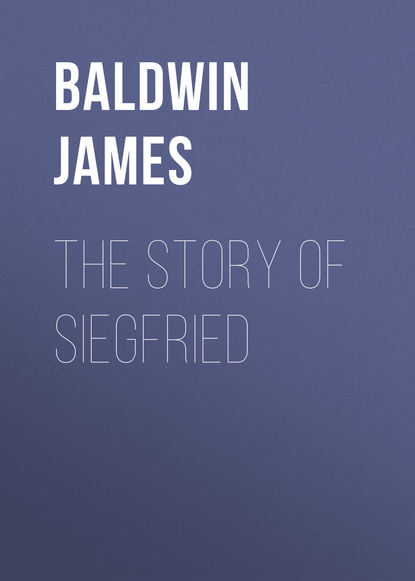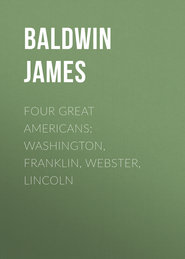По всем вопросам обращайтесь на: info@litportal.ru
(©) 2003-2024.
✖
The Story of Siegfried
Настройки чтения
Размер шрифта
Высота строк
Поля
And he nursed this thought, and brooded over the hatred which he felt towards the blameless boy; but he did not dare to harm him, for fear of their master, Mimer. And Siegfried busied himself at his forge, where the sparks flew as briskly and as merrily as ever before, and his bellows roared from early morning till late at evening. Nor did the foreman’s unkindness trouble him for a moment, for he knew that the master’s heart was warm towards him.
Oftentimes, when the day’s work was done, Siegfried sat with Mimer by the glowing light of the furnace-fire, and listened to the sweet tales which the master told of the deeds of the early days, when the world was young, and the dwarf-folk and the giants had a name and a place upon earth. And one night, as they thus sat, the master talked of Odin the All-Father, and of the gods who dwell with him in Asgard, and of the puny men-folk whom they protect and befriend, until his words grew full of bitterness, and his soul of a fierce longing for something he dared not name. And the lad’s heart was stirred with a strange uneasiness, and he said,—
“Tell me, I pray, dear master, something about my own kin, my father’s fathers,—those mighty kings, who, I have heard said, were the bravest and best of men.”
Then the smith seemed pleased again. And his eyes grew brighter, and lost their far-away look; and a smile played among the wrinkles of his swarthy face, as he told a tale of old King Volsung and of the deeds of the Volsung kings:—
“Long years ago, before the evil days had dawned, King Volsung ruled over all the land which lies between the sea and the country of the Goths. The days were golden; and the good Frey dropped peace and plenty everywhere, and men went in and out and feared no wrong. King Volsung had a dwelling in the midst of fertile fields and fruitful gardens. Fairer than any dream was that dwelling. The roof was thatched with gold, and red turrets and towers rose above. The great feast-hall was long and high, and its walls were hung with sun-bright shields; and the door-nails were of silver. In the middle of the hall stood the pride of the Volsungs,—a tree whose blossoms filled the air with fragrance, and whose green branches, thrusting themselves through the ceiling, covered the roof with fair foliage. It was Odin’s tree, and King Volsung had planted it there with his own hands.
“On a day in winter King Volsung held a great feast in his hall in honor of Siggeir, the King of the Goths, who was his guest. And the fires blazed bright in the broad chimneys, and music and mirth went round. But in the midst of the merry-making the guests were startled by a sudden peal of thunder, which seemed to come from the cloudless sky, and which made the shields upon the walls rattle and ring. In wonder they looked around. A strange man stood in the doorway, and laughed, but said not a word. And they noticed that he wore no shoes upon his feet, but that a cloud-gray cloak was thrown over his shoulders, and a blue hood was drawn down over his head. His face was half-hidden by a heavy beard; and he had but one eye, which twinkled and glowed like a burning coal. And all the guests sat moveless in their seats, so awed were they in the presence of him who stood at the door; for they knew that he was none other than Odin the All-Father, the king of gods and men. He spoke not a word, but straight into the hall he strode, and he paused not until he stood beneath the blossoming branches of the tree. Then, forth from beneath his cloud-gray cloak, he drew a gleaming sword, and struck the blade deep into the wood,—so deep that nothing but the hilt was left in sight. And, turning to the awe-struck guests, he said, ‘A blade of mighty worth have I hidden in this tree. Never have the earth-folk wrought better steel, nor has any man ever wielded a more trusty sword. Whoever there is among you brave enough and strong enough to draw it forth from the wood, he shall have it as a gift from Odin.’ Then slowly to the door he strode again, and no one saw him any more.
“And after he had gone, the Volsungs and their guests sat a long time silent, fearing to stir, lest the vision should prove a dream. But at last the old king arose, and cried, ‘Come, guests and kinsmen, and set your hands to the ruddy hilt! Odin’s gift stays, waiting for its fated owner. Let us see which one of you is the favored of the All-Father.’ First Siggeir, the King of the Goths, and his earls, the Volsungs’ guests, tried their hands. But the blade stuck fast; and the stoutest man among them failed to move it. Then King Volsung, laughing, seized the hilt, and drew with all his strength; but the sword held still in the wood of Odin’s tree. And one by one the nine sons of Volsung tugged and strained in vain; and each was greeted with shouts and laughter, as, ashamed and beaten, he wended to his seat again. Then, at last, Sigmund, the youngest son, stood up, and laid his hand upon the ruddy hilt, scarce thinking to try what all had failed to do. When, lo! the blade came out of the tree as if therein it had all along lain loose. And Sigmund raised it high over his head, and shook it, and the bright flame that leaped from its edge lit up the hall like the lightning’s gleaming; and the Volsungs and their guests rent the air with cheers and shouts of gladness. For no one among all the men of the mid-world was more worthy of Odin’s gift than young Sigmund the brave.”
But the rest of Mimer’s story would be too long to tell you now; for he and his young apprentice sat for hours by the dying coals, and talked of Siegfried’s kinfolk,—the Volsung kings of old. And he told how Siggeir, the Goth king, was wedded to Signy the fair, the only daughter of Volsung, and the pride of the old king’s heart; and how he carried her with him to his home in the land of the Goths; and how he coveted Sigmund’s sword, and plotted to gain it by guile; and how, through presence of friendship, he invited the Volsung kings to visit him in Gothland, as the guests of himself and Signy; and how he betrayed and slew them, save Sigmund alone, who escaped, and for long years lived an outlaw in the land of his treacherous foe. And then he told how Sigmund afterwards came back to his own country of the Volsungs; and how his people welcomed him, and he became a mighty king, such as the world had never known before; and how, when he had grown old, and full of years and honors, he went out with his earls and fighting-men to battle against the hosts of King Lyngi the Mighty; and how, in the midst of the fight, when his sword had hewn down numbers of the foe, and the end of the strife and victory seemed near, an old man, one eyed and bearded, and wearing a cloud-gray cloak, stood up before him in the din, and his sword was broken in pieces, and he fell dead on the heap of the slain.[3 - Sigmund The Volsung.Sigmund the Volsung, in the Volsunga Saga, is represented as the father of Sigurd (Siegfried); but there is such a marked contrast between him, and the wise, home-abiding King Siegmund of the later stories, that I have thought proper to speak of them here as two different individuals. The word “Sigmund,” or “Siegmund,” means literally the mouth of victory. The story of the Volsungs, as here supposed to be related by Mimer, is derived mainly from the Volsunga Saga.] And, when Mimer had finished his tale, his dark face seemed to grow darker, and his twinkling eyes grew brighter, as he cried out in a tone of despair and hopeless yearning,—
“Oh, past are those days of old and the worthy deeds of the brave! And these are the days of the home-stayers,—of the wise, but feeble-hearted. Yet the Norns have spoken; and it must be that another hero shall arise of the Volsung blood, and he shall restore the name and the fame of his kin of the early days. And he shall be my bane; and in him shall the race of heroes have an end.”[4 - The Idea of Fatality.Throughout the story of the Nibelungs and Volsungs, of Sigurd and of Siegfried,—whether we follow the older versions or the mote recent renderings,—there is, as it were, an ever-present but indefinable shadow of coming fate, “a low, inarticulate voice of Doom,” foretelling the inevitable. This is but in consonance with the general ideas of our Northern ancestors regarding the fatality which shapes and controls every man’s life. These ideas are embodied in more than one ancient legend. We find them in the old Anglo-Saxon poem of Beowulf. “To us,” cries Beowulf in his last fight, “to us it shall be as our Weird betides,—that Weird that is every man’s lord!” “Each man of us shall abide the end of his life-work; let him that may work, work his doomed deeds ere death comes!” Similar ideas prevailed among the Greeks. Read, for example, that passage in the Iliad describing the parting of Hector and Andromache, and notice the deeper meaning of Hector’s words.]
Siegfried’s heart was strangely stirred within him as he hearkened to this story of ancient times and to the fateful words of the master, and for a long time he sat in silent thought; and neither he nor Mimer moved, or spoke again, until the darkness of the night had begun to fade, and the gray light of morning to steal into the smithy. Then, as if moved by a sudden impulse, he turned to the master, and said,—
“You speak of the Norns, dear master, and of their foretelling; but your words are vague, and their meaning very broad. When shall that hero come? and who shall he be? and what deeds shall be his doing?”
“Alas!” answered Mimer, “I know not, save that he shall be of the Volsung race, and that my fate is linked with his.”
“And why do you not know?” returned Siegfried. “Are you not that old Mimer, in whom it is said the garnered wisdom of the world is stored? Is there not truth in the old story that even Odin pawned one of his eyes for a single draught from your fountain of knowledge? And is the possessor of so much wisdom unable to look into the future with clearness and certainty?”
“Alas!” answered Mimer again, and his words came hard and slow, “I am not that Mimer, of whom old stories tell, who gave wisdom to the All-Father in exchange for an eye. He is one of the giants, and he still watches his fountain in far-off Jotunheim.[5 - Mimer.“The Vilkinasaga brings before us yet another smith, Mimer, by whom not only is Velint instructed in his art, but Sigfrit (Siegfried) is brought up,—another smith’s apprentice. He is occasionally mentioned in the later poem of Biterolf, as Mime the Old. The old name of Munster in Westphalia was Mimigardiford; the Westphalian Minden was originally Mimidun; and Memleben on the Unstrut, Mimileba.. .. The elder Norse tradition names him just as often, and in several different connections. In one place, a Mimingus, a wood-satyr, and possessor of a sword and jewels, is interwoven into the myth of Balder and Hoder. The Edda gives a higher position to its Mimer. He has a fountain, in which wisdom and understanding lie hidden: drinking of it every morning, he is the wisest, most intelligent, of men. To Mimer’s fountain came Odin, and desired a drink, but did not receive it till he had given one of his eyes in pledge, and hidden it in the fountain: this accounts for Odin being one-eyed.... Mimer is no Asa, but an exalted being with whom the Asas hold converse, of whom they make use,—the sum total of wisdom, possibly an older Nature-god. Later fables degraded him into a wood-sprite, or clever smith.”—Grimm’s Deutsche Mythologie, I. p. 379.Concerning the Mimer of the Eddas, Professor Anderson says, “The name Mimer means the knowing. The Giants, being older than the Asas, looked deeper than the latter into the darkness of the past. They had witnessed the birth of the gods and the beginning of the world, and they foresaw their downfall. Concerning both these events, the gods had to go to them for knowledge. It is this wisdom that Mimer keeps in his fountain.”—Norse Mythology, p 209.In the older versions of the legend, the smith who cared for Siegfried (Sigurd) is called, as we have before noticed, Regin. He is thus described by Morris:—“The lore of all men he knew,And was deft in every cunning, save the dealings of thesword.So sweet was his tongue-speech fashioned, that mentrowed his every word.His hand with the harp-strings blended was the minglerof delightWith the latter days of sorrow: all tales he toldaright.The Master of the Masters in the smithying craft washe;And he dealt with the wind and the weather and thestilling of the sea;Nor might any learn him leech-craft, for before thatrace was made,And that man-folk’s generation, all their life-days hadhe weighed.” Sigurd the Volsung, Bk. II.] I claim kinship with the dwarfs, and am sometimes known as an elf, sometimes as a wood-sprite. Men have called me Mimer because of my wisdom and skill, and the learning which I impart to my pupils. Could I but drink from the fountain of the real Mimer, then the wisdom of the world would in truth be mine, and the secrets of the future would be no longer hidden. But I must wait, as I have long waited, for the day and the deed and the doom that the Norns have foretold.”
And the old strange look of longing came again into his eyes, and the wrinkles on his swarthy face seemed to deepen with agony, as he arose, and left the smithy. And Siegfried sat alone before the smouldering fire, and pondered upon what he had heard.
Adventure II. Greyfell
Many were the pleasant days that Siegfried spent in Mimer’s smoky smithy; and if he ever thought of his father’s stately dwelling, or of the life of ease which he might have enjoyed within its halls, he never by word or deed showed signs of discontent. For Mimer taught him all the secrets of his craft and all the lore of the wise men. To beat hot iron, to shape the fire-edged sword, to smithy war-coats, to fashion the slender bracelet of gold and jewels,—all this he had already learned. But there were many other things to know, and these the wise master showed him. He told him how to carve the mystic runes which speak to the knowing ones with silent, unseen tongues; he told him of the men of other lands, and taught him their strange speech; he showed him how to touch the harp-strings, and bring forth bewitching music: and the heart of Siegfried waxed very wise, while his body grew wondrous strong. And the master loved his pupil dearly.
But the twelve apprentices grew more jealous day by day, and when Mimer was away they taunted Siegfried with cruel jests, and sought by harsh threats to drive him from the smithy; but the lad only smiled, and made the old shop ring again with the music from his anvil. On a day when Mimer had gone on a journey, Veliant, the foreman, so far forgot himself as to strike the boy. For a moment Siegfried gazed at him with withering scorn; then he swung his hammer high in air, and brought it swiftly down, not upon the head of Veliant, who was trembling with expectant fear, but upon the foreman’s anvil. The great block of iron was shivered by the blow, and flew into a thousand pieces. Then, turning again towards the thoroughly frightened foreman, Siegfried said, while angry lightning-flashes darted from his eyes,—
“What if I were to strike you thus?”
Veliant sank upon the ground, and begged for mercy.
“You are safe,” said Siegfried, walking away. “I would scorn to harm a being like you!”
The apprentices were struck dumb with amazement and fear; and when Siegfried had returned to his anvil they one by one dropped their hammers, and stole away from the smithy. In a secret place not far from the shop, they met together, to plot some means by which they might rid themselves of him whom they both hated and feared.
The next morning Veliant came to Siegfried’s forge, with a sham smile upon his face. The boy knew that cowardice and base deceit lurked, ill concealed, beneath that smile; yet, as he was wont to do, he welcomed the foreman kindly.
“Siegfried,” said Veliant, “let us be friends again. I am sorry that I was so foolish and so rash yesterday, and I promise that I will never again be so rude and unmanly as to become angry at you. Let us be friends, good Siegfried! Give me your hand, I pray you, and with it your forgiveness.”
Siegfried grasped the rough palm of the young smith with such a gripe, that the smile vanished from Veliant’s face, and his muscles writhed with pain.
“I give you my hand, certainly,” said the boy, “and I will give you my forgiveness when I know that you are worthy of it.”
As soon as Veliant’s aching hand allowed him speech, he said,—
“Siegfried, you know that we have but little charcoal left for our forges, and our master will soon return from his journey. It will never do for him to find us idle, and the fires cold. Some one must go to-day to the forest-pits, and bring home a fresh supply of charcoal. How would you like the errand? It is but a pleasant day’s journey to the pits; and a ride into the greenwood this fine summer day would certainly be more agreeable than staying in the smoky shop.”
“I should like the drive very much,” answered Siegfried; “but I have never been to the coal-pits, and I might lose my way in the forest.”
“No danger of that,” said Veliant. “Follow the road that goes straight into the heart of the forest, and you cannot miss your way. It will lead you to the house of Regin, the master, the greatest charcoal-man in all Rhineland. He will be right glad to see you for Mimer’s sake, and you may lodge with him for the night. In the morning he will fill your cart with the choicest charcoal, and you can drive home at your leisure; and, when our master comes again, he will find our forges flaming, and our bellows roaring, and our anvils ringing, as of yore.”
Siegfried, after some further parley, agreed to undertake the errand, although he felt that Veliant, in urging him to do so, wished to work him some harm. He harnessed the donkey to the smith’s best cart, and drove merrily away along the road which led towards the forest.[6 - Siegfried’s Journey Into The Forest.“In the shop of Mimer, Siegfried was nowise in his proper element, ever quarrelling with his fellow-apprentices, nay, as some say, breaking the hardest anvils into shivers by his too stout hammering; so that Mimer, otherwise a first-rate smith, could by no means do with him there. He sends him, accordingly, to the neighboring forest to fetch charcoal, well aware that a monstrous dragon, one Regin, the smith’s own brother, would meet him, and devour him. But far otherwise it proved.”—Carlyle, on The Nibelungen Lied.] The day was bright and clear; and as Siegfried rode through the flowery meadows, or betwixt the fields of corn, a thousand sights and sounds met him, and made him glad. Now and then he would stop to watch the reapers in the fields, or to listen to the song of some heaven-soaring lark lost to sight in the blue sea overhead. Once he met a company of gayly dressed youths and maidens, carrying sheaves of golden grain,—for it was now the harvest-time,—and singing in praise of Frey, the giver of peace and plenty.
“Whither away, young prince?” they merrily asked.
“To Regin, the coal-burner, in the deep greenwood,” he answered.
“Then may the good Frey have thee in keeping!” they cried. “It is a long and lonesome journey.” And each one blessed him as they passed.
It was nearly noon when he drove into the forest, and left the blooming meadows and the warm sunshine behind him. And now he urged the donkey forwards with speed; for he knew that he had lost much precious time, and that many miles still lay between him and Regin’s charcoal-pits. And there was nothing here amid the thick shadows of the wood to make him wish to linger; for the ground was damp, and the air was chilly, and every thing was silent as the grave. And not a living creature did Siegfried see, save now and then a gray wolf slinking across the road, or a doleful owl sitting low down in some tree-top, and blinking at him in the dull but garish light. Evening at last drew on, and the shadows in the wood grew deeper; and still no sign of charcoal-burner, nor of other human being, was seen. Night came, and thick darkness settled around; and all the demons of the forest came forth, and clamored and chattered, and shrieked and howled. But Siegfried was not afraid. The bats and vampires came out of their hiding-places, and flapped their clammy wings in his face; and he thought that he saw ogres and many fearful creatures peeping out from behind every tree and shrub. But, when he looked upwards through the overhanging tree-tops, he saw the star-decked roof of heaven, the blue mantle which the All-Father has hung as a shelter over the world; and he went bravely onwards, never doubting but that Odin has many good things in store for those who are willing to trust him.
And by and by the great round moon arose in the east, and the fearful sounds that had made the forest hideous began to die away; and Siegfried saw, far down the path, a red light feebly gleaming. And he was glad, for he knew that it must come from the charcoal-burners’ pits. Soon he came out upon a broad, cleared space; and the charcoal-burners’ fires blazed bright before him; and some workmen, swarthy and soot-begrimed, came forwards to meet him.
“Who are you?” they asked; “and why do you come through the forest at this late hour?”
“I am Siegfried,” answered the boy; “and I come from Mimer’s smithy. I seek Regin, the king of charcoal-burners; for I must have coal for my master’s smithy.”
“Come with me,” said one of the men: “I will lead you to Regin.”
Siegfried alighted from his cart, and followed the man to a low-roofed hut not far from the burning pits. As they drew near, they heard the sound of a harp, and strange, wild music within; and Siegfried’s heart was stirred with wonder as he listened. The man knocked softly at the door, and the music ceased.
“Who comes to break into Regin’s rest at such a time as this?” said a rough voice within.
“A youth who calls himself Siegfried,” answered the man. “He says that he comes from Mimer’s smithy, and he would see you, my master.”
“Let him come in,” said the voice.
Siegfried passed through the low door, and into the room beyond; and so strange was the sight that met him that he stood for a while in awe, for never in so lowly a dwelling had treasures so rich been seen. Jewels sparkled from the ceiling; rare tapestry covered the walls; and on the floor were heaps of ruddy gold and silver, still unfashioned. And in the midst of all this wealth stood Regin, the king of the forest, the greatest of charcoal-men. And a strange old man he was, wrinkled and gray and beardless; but out of his eyes sharp glances gleamed of a light that was not human, and his heavy brow and broad forehead betokened wisdom and shrewd cunning. And he welcomed Siegfried kindly for Mimer’s sake, and set before him a rich repast of venison, and wild honey, and fresh white bread, and luscious grapes. And, when the meal was finished, the boy would have told his errand, but Regin stopped him.
“Say nothing of your business to-night,” said he; “for the hour is already late, and you are weary. Better lie down, and rest until the morrow; and then we will talk of the matter which has brought you hither.”
And Siegfried was shown to a couch of the fragrant leaves of the myrtle and hemlock, overspread with soft white linen, such as is made in the far-off Emerald Isle; and he was lulled to sleep by sweet strains of music from Regin’s harp,—music which told of the days when the gods were young on the earth. And as he slept he dreamed. He dreamed that he stood upon the crag of a high mountain, and that the eagles flew screaming around him, and the everlasting snows lay at his feet, and the world in all its beauty was stretched out like a map below him; and he longed to go forth to partake of its abundance, and to make for himself a name among men. Then came the Norns, who spin the thread, and weave the woof, of every man’s life; and they held in their hands the web of his own destiny. And Urd, the Past, sat on the tops of the eastern mountains, where the sun begins to rise at dawn; while Verdanda, the Present, stood in the western sea, where sky and water meet. And they stretched the web between them, and its ends were hidden in the far-away mists. Then with all their might the two Norns span the purple and golden threads, and wove the fatal woof. But as it began to grow in beauty and in strength, and to shadow the earth with its gladness and its glory, Skuld, the pitiless Norn of the Future, seized it with rude fingers, and tore it into shreds, and cast it down at the feet of Hela, the white queen of the dead.[7 - The Norns.The Norns are the Fates, which watch over man through life. They are Urd the Past, Verdande the Present, and Skuld the Future. They approach every new-born child, and utter his doom. They are represented as spinning the thread of fate, one end of which is hidden by Urd in the far east, the other by Verdande in the far west. Skuld stands ready to rend it in pieces. —See Grimm’s Teutonic Mythology, p. 405, also Anderson’s Norse Mythology, p. 209.The three weird women in Shakespeare’s Tragedy of Macbeth represent a later conception of the three Norns, now degraded to mere witches.Compare the Norns with the Fates of the Greek Mythology. These, also, are three in number. They sit clothed in white, and garlanded, singing of destiny. Clotho, the Past, spins; Lachesis, the Present, divides; and Atropos, the Future, stands ready with her shears to cut the thread.] And the eagles shrieked, and the mountain shook, and the crag toppled, and Siegfried awoke.
The next morning, at earliest break of day, the youth sought Regin, and made known his errand.
“I have come for charcoal for my master Mimer’s forges. My cart stands ready outside; and I pray you to have it filled at once, for the way is long, and I must be back betimes.”
Then a strange smile stole over Regin’s wrinkled face, and he said,—
“Does Siegfried the prince come on such a lowly errand? Does he come to me through the forest, driving a donkey, and riding in a sooty coal-cart? I have known the day when his kin were the mightiest kings of earth, and they fared through every land the noblest men of men-folk.”











